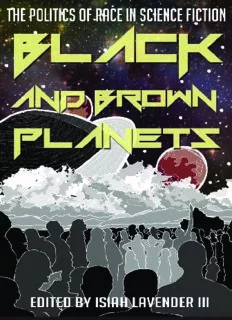
Black and Brown Planets: The Politics of Race in Science Fiction PDF
Preview Black and Brown Planets: The Politics of Race in Science Fiction
Black and Brown Planets Black and Brown Planets • • • The Politics of Race in Science Fiction Edited by Isiah Lavender III University Press of Mississippi / Jackson www.upress.state.ms.us The University Press of Mississippi is a member of the Association of American University Presses. Frontis image by Jaz C. Alexander Copyright © 2014 by University Press of Mississippi All rights reserved Manufactured in the United States of America Edward James, “Yellow, Black, Metal, and Tentacled: The Race Question in American Science Fiction” was originally published in Science Fiction, Social Conflict, and War, edited by Philip John Davies. Used by permission of Manchester University Press. First printing 2014 ∞ Library of Congress Cataloging-in-Publication Data Black and brown planets : the politics of race in science fiction / edited by Isiah Lavender III. pages cm Includes bibliographical references and index. ISBN 978-1-62846-123-7 (hardback) — ISBN 978-1-62846-124-4 (ebook) 1. Science fiction, American—History and criticism. 2. Race in literature. 3. Minorities in literature. I. Lavender, Isiah, editor. PS374.S35B55 2014 813’.08762093529—dc23 2014010170 British Library Cataloging-in-Publication Data available Contents vii Acknowledgments 3 Introduction: Coloring Science Fiction Isiah Lavender III Part one. Black Planets 15 The Bannekerade: Genius, Madness, and Magic in Black Science Fiction Lisa Yaszek 31 “The Best Is Yet to Come”; or, Saving the Future: Star Trek: Deep Space Nine as Reform Astrofuturism De Witt Douglas Kilgore 48 Far beyond the Star Pit: Samuel R. Delany Gerry Canavan 65 Digging Deep: Ailments of Difference in Octavia Butler’s “The Evening and the Morning and the Night” Isiah Lavender III 83 The Laugh of Anansi: Why Science Fiction Is Pertinent to Black Children’s Literature Pedagogy Marleen S. Barr Part two. Brown Planets 101 Haint Stories Rooted in Conjure Science: Indigenous Scientific Literacies in Andrea Hairston’s Redwood and Wildfire Grace L. Dillon vi Contents 117 Questing for an Indigenous Future: Leslie Marmon Silko’s Ceremony as Indigenous Science Fiction Patrick B. Sharp 131 Monteiro Lobato’s O presidente negro (The Black President): Eugenics and the Corporate State in Brazil M. Elizabeth Ginway 146 Mestizaje and Heterotopia in Ernest Hogan’s High Aztech Lysa M. Rivera 163 Virtual Reality at the Border of Migration, Race, and Labor Matthew Goodwin 177 A Dis-(Orient)ation: Race, Technoscience, and The Windup Girl Malisa Kurtz 195 Reflections on “Yellow, Black, Metal, and Tentacled,” Twenty-Four Years On Edward James 199 Yellow, Black, Metal, and Tentacled: The Race Question in American Science Fiction Edward James coda 225 “The Wild Unicorn Herd Check-In”: The Politics of Race in Science Fiction Fandom Robin Anne Reid 241 Contributors 245 Index Acknowledgments First and foremost, I must thank God for providing me with the ambition and requisite skills to see this collection to fruition. Second, I thank my wife, Heather, for all of her love, support, prayer, and sacrifice; my sons, Kingsley and Frazier; and my sister, Melissa, for their patience with me. Though I have certainly learned that editing a collection is not at all easy, I am grateful to all of the contributors for the trust they placed in me, for their willingness to revise, and for taking this journey with me. I especially appreciate the advice and additional help offered by Gerry Canavan and Lisa Yaszek. The idea for this collection originated at the 2010 International Conference of the Fantastic in the Arts, where I moderated a panel, “Black and/or Brown Planets: Politics and Race in Science Fiction,” that featured Grace Dillon, David Higgins, De Witt Kilgore, and Patrick Sharp. I am very grateful to these panel- ists as well as to the audience members who came to listen to their erudition. Likewise, I am indebted to Rachel Haywood Ferreira for spreading the word about the call for papers. I deeply regret not being able to include several more essays by Henri-Simon Blanc-Hoang, Biling Chen, Wei Ming Dariotis, Sharon DeGraw, Uppinder Mehan, and Takayuki Tatsumi. I can only hope they accept my heartfelt apology and perhaps a meal when our paths next cross. I am also grateful to Brian Attebery for helping me refine my own Butler essay as well as to Dale Knickerbocker and Jen Parrack for pointing out the obvious regarding Butler’s character, Beatrice Alcantara. I would be remiss not to express my thanks to my old UCA colleagues—Chuck Bane, Dwayne Coleman, Sonya Fritz, Lori Leavell, David O’Hara, and Wayne Stengel—for listening to me drone on and on about the challenges of editing. I must also thank UCA for providing the time necessary to complete the first draft of this project with a Fall 2012 sabbatical. Likewise, I have nothing but gratitude toward my new LSU colleagues— Chris Barrett, Michael Bibler, Lauren Coats, Brannon Costello, Jennifer Davis, Daren Dean, Angeletta Gourdine, Benjy Kahan, Gerry Kennedy, Phillip Maciak, Michelle Massé, Elsie Mitchie, Rick Moreland, Anna Nardo, Daniel Novak, Lisi Oliver, and Irina Shport—for showing an immediate interest in my work. vii viii Acknowledgments I am also thankful to Manchester University Press for giving Edward James permission to reprint his foundational essay, “Yellow, Black, Metal, and Tentacled: The Race Question in American Science Fiction,” which first appeared in Philip John Davies, ed., Science Fiction, Social Conflict, and War (1990): 26–49. His essay appears here in virtually identical form. Finally, I am particularly grateful to the University Press of Mississippi. Walter Biggins believed in the project, Vijay Shah helped me see it through, Katie Keene kept me on schedule, and Ellen Goldlust was an amazing copyeditor. Black and Brown Planets
Description: